|
|
|
Sort Order |
|
|
|
Items / Page
|
|
|
|
|
|
|
| Srl | Item |
| 1 |
ID:
187393
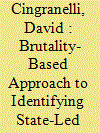

|
|
|
|
|
| Summary/Abstract |
The comparative study of atrocities and atrocity prevention faces several obstacles including a lack of consensus on the universe of cases and too few cases to statistically test alternative theories. The brutality-based (BB) conception is based on the idea that widespread, state-led violations of physical integrity rights constitute an assault on the personhood and human dignity of the members of society— a mass atrocity. Applying this idea to all countries annually systematically identifies a larger number of atrocities and facilitates categorization into three levels of intensity. The BB methodology for generating annual atrocity lists is replicable and transparent. The findings show that, between 1981 and 2019, the frequency of atrocities as defined and identified by other projects has been decreasing, but BB atrocities have been increasing. The sequence of different types of widespread physical integrity violations suggests new avenues for research on atrocity occurrence, escalation, de-escalation, and cessation.
|
|
|
|
|
|
|
|
|
|
|
|
|
|
|
|
| 2 |
ID:
187391
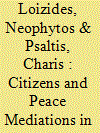

|
|
|
|
|
| Summary/Abstract |
How can areas of potential agreement be identified and endorsed by citizens in protracted conflicts? In an effort to answer this question, the article introduces a conjoint experiment across the ethnically and territorially split communities of Cyprus and tests a range of hypotheses about the structure of public opinion with respect to a future settlement. We test hypotheses on security and credible commitments, the legacy of past negotiations, as well as transitional justice mechanisms following United Nations plans to mediate the conflict between Greek and Turkish Cypriots. Contrary to conventional wisdom, we demonstrate that a zone of possible agreement (ZOPA) exists from a public opinion perspective. We specifically explore power-sharing in the context of security, provisions for the internally displaced, federal courts, and territorial readjustments and highlight their relative importance for public opinion interventions across conflict-ridden societies.
|
|
|
|
|
|
|
|
|
|
|
|
|
|
|
|
| 3 |
ID:
187388
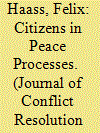

|
|
|
|
|
| Summary/Abstract |
Citizen engagement in and support for peace processes have been deemed important for sustainable peace after civil wars. Yet much of what we know about peace processes in civil wars centers on the interests of elite actors. This special feature aims to advance a research agenda focusing on citizens in peace processes to address this mismatch. In the introduction to the special feature, we first present empirical evidence situating citizens in relation to civil war peace processes. We then trace the current state of the literature on the roles of citizens in peace processes. Following that, we introduce a conceptual framework designed to improve scholarly analysis of the political behavior of citizens in peace processes. We also locate the individual contributions to the special feature within the framework in order to demonstrate its utility and as a means of helping to identify directions for future research.
|
|
|
|
|
|
|
|
|
|
|
|
|
|
|
|
| 4 |
ID:
187390


|
|
|
|
|
| Summary/Abstract |
Research on postwar peace focuses primarily on how elites and institutions can prevent relapse into civil war. In line with this special issue’s focus on citizens’ experiences, we take a micro-level approach to explore peace beyond the absence of war. We investigate how members of opposing sides experience peace a decade after a decisive victory of the majority. Using original survey data from a representative sample of 2000 respondents in 2018 Sri Lanka, we find that even one decade after the conflict members of the Sinhalese winning majority are consistently more likely to report improvements in peace than Tamils, who were represented by the defeated minority. But the benefit of a “victor’s peace” does not seem to translate into an optimistic outlook of the victorious group, nor does it increase people’s endorsement for repressive state measures. Despite the drastically improved physical security for the defeated ethnic minority since the war, they experience a deterioration in other dimensions of peace. Our findings have important implications for a deeper understanding of variations in peace and reconciliation processes.
|
|
|
|
|
|
|
|
|
|
|
|
|
|
|
|
| 5 |
ID:
187392
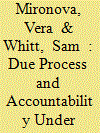

|
|
|
|
|
| Summary/Abstract |
Do citizens care about due process rights when holding insurgent groups accountable for violence? We examine public perceptions of justice and fairness in judicial proceedings brought against suspected Islamic State (ISIS) militants and their supporters in Mosul, Iraq. We conducted a survey of Mosul residents and people in ISIS-affiliated displacement camps outside Mosul to evaluate public support for detainee due process rights. Using a trial and punishment survey experiment, we find that Mosul residents, while favoring capital punishment for ISIS involvement, are also sensitive to procedural due process rights of the accused. People with self-reported ISIS affiliations, in contrast, are more concerned with substantive due process, and do not see capital punishment outcomes as fair, regardless of procedural considerations. Although rebel group sympathizers and opponents have clashing perspectives on what constitutes equitable punishment for participation in insurgency, both recognize the importance of due process rights to long-term peace and security.
|
|
|
|
|
|
|
|
|
|
|
|
|
|
|
|
| 6 |
ID:
187394
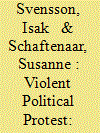

|
|
|
|
|
| Summary/Abstract |
This article presents the Uppsala Conflict Data Program (UCDP) “Violent Political Protest” (VPP) data set: a new –standalone- category of organized violence, which complements, and is compatible with, UCDP’s three categories of organized violence: one-sided violence, non-state, and state-based conflict. It consists of violent political protests, with at least 25 casualties during a year, in which informally organized civilians challenge states over governmental or territorial issues. We describe the data collection process, and demonstrate the data’s use with empirical analyses. Violent political protest is present globally, but most prevalent in the Middle East and Africa, and increasingly common over time. Violent political protest frequently co-occurs with state-based conflicts, but rarely due to conflict escalation. We explore if this is due to shared contexts, and find that gender inequality increases the likelihood of VPP onset, similar to state-based conflicts. Finally, we identify avenues for future research, including using VPP to assist in a more precise and complete analysis of organized violence.
|
|
|
|
|
|
|
|
|
|
|
|
|
|
|
|
| 7 |
ID:
187389


|
|
|
|
|
| Summary/Abstract |
Peace agreements are negotiated and signed by representatives of the government and the rebels, often after many years of violent conflict, but their ability to transform a war-torn society hinges on the approval of ordinary people. Yet we have little systematic knowledge of what ordinary people think of peace agreements in the long run. This study begins to fill that gap, drawing on a set of comparative public opinion surveys from Guatemala, Nepal, and Northern Ireland, three cases where long civil wars were ended by peace agreements. The peace agreements in these countries have strong popular support, though there is variation across specific provisions. Across these cases, our findings suggest that legacies of violence are not generally associated with long-term support for peace agreements. However, when we look at provisions that grant concessions to the rebels, there is some evidence of lasting legacies.
|
|
|
|
|
|
|
|
|
|
|
|
|
|
|
|
|
|
|
|
|